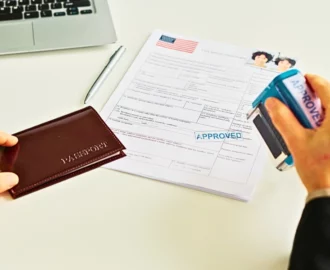What is a special immigrant visa? A Special Immigrant Visa (SIV) is a type of visa available to certain foreign nationals who have provided services to the U.S. government and face danger in their home countries as a result.

If you are an immigrant who has assisted the U.S. government in Afghanistan or Iraq, you may qualify for the Special Immigrant Visa (SIV) program. To date, multiple SIV programs remain active, and U.S. Citizenship and Immigration Services (USCIS) grants this visa type to a limited number of Iraqi and Afghan immigrants every year. Established in 2009, the SIV program has seen a considerable backlog that the government is looking to alleviate.
To find out whether you’re eligible for an SIV or another immigrant program, contact the Chicago immigration lawyers at Cho Immigration Law by calling 312-853-3088.
The Start of the Special Immigrant Visa Program
Congress established the Special Immigrant Visa (SIV) program to protect Afghan and Iraqi nationals who assisted U.S. forces and government entities during military operations in their countries. These individuals often worked as translators, interpreters, and in other essential roles, directly supporting American troops, diplomats, and contractors.
The program was created in response to the significant threats these individuals faced due to their association with the U.S. military and government. The two main legislative acts that authorized SIVs for these groups are:
- The Afghan Allies Protection Act of 2009, which provided SIVs to Afghans who worked with the U.S.
- The Refugee Crisis in Iraq Act of 2007, which did the same for Iraqi nationals.
These programs were designed to offer permanent protection by granting qualifying individuals lawful permanent residence (a Green Card) in the U.S. Individuals who qualify for the program may be able to receive one visa for themselves. They also have the ability to apply for visas for their families, including spouses and children under 21.
At this point, there are tens of thousands of Afghans who qualify for the program. Meanwhile, only approximately 118,000 SIV holders and their families have evacuated in an attempt to seek protection.
In 2023, the U.S. government approved around 26,500 SIVs for Afghan citizens, which is over twice as many as in 2022.
What Are the Eligibility Requirements for an SIV?
To qualify for an SIV, you must meet the following requirements.
- You must be an Iraqi or Afghan citizen, and
- You must have served as an interpreter or translator for the U.S. Armed Forces, or under a Chief of Commission authority for at least 12 months, or
- You must have worked on behalf of, or as an employee of, the U.S. government for at least 12 months in a specific period (For Afghan SIVs, this is between October 7, 2001, and December 31, 2024; for Iraqi SIVs, this period is between March 20, 2003, and September 30, 2013)
- You must show that you have experienced or face a serious threat due to your assistance to the U.S. government
Applicants must also undergo a medical exam, pass a visa interview, demonstrate good moral character, provide a letter of recommendation from a senior supervisor, and provide necessary documentation, including work verification and identity proof.
Immigrants living in the U.S. under SIV status experience the benefits of refugees and others under various U.S. visa categories, such as access to federal assistance programs, cash and medical assistance, employment preparation, and training to develop English language skills.
How to Apply for a Special Immigrant Visa
When applying for a Special Immigrant Visa, you must first determine which SIV program you would like to apply for based on your situation as an Iraqi or Afghan national. You can better determine which program suits your needs with the help of experienced attorneys for immigration legal services.
Chief of Mission (COM) Approval
To obtain COM approval, an applicant must submit the following:
- Letter of Employment – Confirms at least one year of employment with the U.S. government or an eligible contractor.
- Letter of Recommendation – Must be from a U.S. citizen who supervised the applicant.
- Form DS-157 – Supplemental Non-Immigrant Visa Application.
- Proof of Afghan Nationality – A passport copy, tazkera (Afghan national ID) with translation, or birth certificate.
- Identifying Information – Full name, gender, aliases, and work location.
- Copy of Employment Badge – If available.
- Description of Threats – Documentation of any threats faced due to U.S. employment.
Once the U.S. Department of State approves the COM request, the applicant moves to the next step.
2. Submitting Form I-360 to USCIS
After receiving COM approval, the applicant submits Form I-360 (Petition for Amerasian, Widow(er), or Special Immigrant) to USCIS. Required documents include:
- Completed Form I-360
- Chief of Mission Approval Letter
- Letter of Recommendation
- Proof of Employment
- Copy of Passport
- Form I-94 (if applying from within the U.S.)
Applicants outside the U.S. should scan and email PDF copies of documents to the designated National Visa Center (NVC) email. Zipped files are not accepted. Documents must be clear, legible, and include all seals or stamps. If submitting a tazkera, an English translation must be included.
Additional Clarifications:
After USCIS approves Form I-360, applicants must submit Form DS-260 (Immigrant Visa Application) online and prepare for the visa interview. Next, attend the interview at a U.S. Embassy or Consulate, providing additional documents as needed. You’ll need to complete security processing and a medical examination before visa issuance.
Upon visa approval, the applicant can enter the U.S. and receive a Green Card (permanent residence) upon arrival.
What if I Made a Mistake When Applying for a SIV?
In the event the NVC determines you made an error in your documents, or you did not submit the correct forms, you will be contacted and asked to provide updated information or the missing documents. Once the documents have been updated, e-mail your forms back to the NVC without changing the subject line in the e-mail.
If it has been determined that you have correctly submitted all documentation, you will receive an e-mail announcing that your application has been completed as far as documentation goes. The NVC will then work with the appropriate agencies to schedule your appointment once a visa is available.
The Growing Demand for Special Immigrant Visas
Throughout the Taliban’s acquisition of Afghanistan and the U.S.’s withdrawal, Afghan citizens have sought protection from the U.S. as they face many dangers. The Taliban is actively searching for any citizens who may have helped the U.S. and could cause harm to them if exposed. Subsequently, a growing number of Afghan citizens are seeking asylum in the U.S. as a means of escaping the Taliban’s grasp.
As a result, the SIV program has become a necessity for many who are trying to evade the dangers in their home country. With reduced backlog and expedited approval, many people could benefit from this program as they request help from the federal government.
How an Immigration Attorney in Chicago Can Help
Applying for a Special Immigrant Visa (SIV) can be complicated, and any mistakes or missing documents can lead to delays or denials. A Chicago immigration attorney can assist you in several ways:
Evaluating Your Eligibility – An attorney can review your employment history, threat documentation, and other requirements to determine if you qualify for an SIV.
Gathering and Organizing Documents – Ensuring all necessary documents, such as letters of recommendation, proof of employment, and nationality documents, are correctly prepared and submitted.
Filing the I-360 Petition – An attorney can assist in completing and submitting Form I-360 with USCIS, ensuring all required evidence is included.
Completing the Visa Application – Guidance in accurately filling out Form DS-260 and submitting it to the National Visa Center (NVC) to avoid processing delays.
Preparing for the Visa Interview – Immigration lawyers help applicants understand potential questions and ensure they bring the right documents to the U.S. Embassy or Consulate interview.
Handling Appeals and Denials – If your SIV petition is denied or delayed, an attorney can appeal the decision, provide additional evidence, or file a request for reconsideration.
Supporting Family Members – If you are applying with your spouse or children, an attorney can ensure they are included in the process and receive proper documentation.
Given the high stakes involved, legal assistance is recommended. Working with an immigration attorney in Chicago can help streamline the process and improve your chances of a successful SIV application.
The key is finding the right immigration lawyer based on your unique requirements. At Cho Immigration Law, we have the experience and knowledge needed to help you with nearly any type of case. To consult an immigration lawyer for help navigating the SIV program or for other immigration needs, contact us today.




